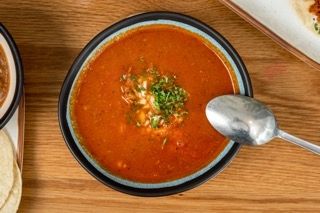Explore what’s best on the lunch and dinner menu this week
Is Mexican Food Healthy And Balanced? Unloading the Nutritional Benefits of Typical Ingredients
The inquiry of whether Mexican food is healthy welcomes an exploration of its typical components. Beans and corn offer as foundational staples, abundant in healthy protein and fiber. Avocados offer beneficial fats, while different herbs and flavors include flavor and wellness benefits - tacos. With each other, these components produce a tapestry of nourishment. However, the healthfulness of Mexican cuisine typically depends upon prep work methods and part dimensions. What role do these variables play in identifying its total nutritional value?
The Power of Beans: Protein and Fiber-Rich Staples
Although commonly overlooked, beans function as a cornerstone of Mexican cuisine, using a wide range of dietary advantages. Rich in healthy protein, they are a superb plant-based choice for those seeking to satisfy their dietary protein needs. This high healthy protein content supports muscle repair work and growth, making beans invaluable for both meat-eaters and vegetarians alike. Furthermore, beans are an exceptional source of nutritional fiber, which assists in food digestion and advertises a feeling of volume, possibly assisting with weight management.
The variety of beans made use of in Mexican recipes, such as black beans, pinto beans, and kidney beans, adds to a varied taste profile and can enhance dishes nutritionally. Beans are low in fat and have essential vitamins and minerals, consisting of folate, iron, and magnesium. With each other, these qualities make beans an important ingredient, supplying both nutrients and nourishment in traditional Mexican price.

Corn: a Versatile Grain With Nutritional Perks
Corn stands out as a flexible grain basic to Mexican cuisine, commemorated not just for its culinary applications however additionally for its excellent nutritional account. As a main ingredient in recipes like tortillas, tamales, and pozole, corn provides crucial nutrients that add to a balanced diet. Rich in carbohydrates, it works as a substantial energy resource, while additionally being low in fat, making it a positive alternative for numerous dietary needs.
Corn is a great resource of nutritional fiber, which assists in food digestion and advertises satiety. It includes significant amounts of vitamins such as B-complex vitamins, which are necessary for basal metabolism. The presence of antioxidants, particularly carotenoids, contributes to total health by minimizing oxidative stress and anxiety. Additionally, corn is gluten-free, accommodating those with gluten level of sensitivities. Overall, the dietary benefits of corn emphasize its relevance in typical Mexican food and its duty in a healthy and balanced diet regimen.
Avocados: Healthy Fats and Nutrients in Every Bite
Avocados play a substantial function in Mexican cuisine, matching dishes with their creamy texture and abundant taste. Beyond their culinary appeal, avocados are commemorated for their remarkable dietary profile. They are a rich resource of healthy and balanced monounsaturated fats, which can assist lower bad cholesterol levels and assistance heart wellness. In addition, avocados are loaded with important minerals and vitamins, consisting of potassium, vitamin E, and B vitamins, contributing to overall health.
The high fiber web content in avocados help digestion and promotes satiety, making them navigate to this site a helpful addition to any dish. Their special nutrient structure can also support skin health and provide anti-inflammatory advantages. Integrating avocados into typical Mexican meals or enjoying them as a standalone treat can enhance both flavor and nourishment, showing why they are a cherished staple in Mexican cuisine. On the whole, avocados use a delicious means to take pleasure in healthy fats and important nutrients in every bite.

Spices and Herbs: Flavorful Health Boosters
While taking pleasure in the abundant flavors of Mexican cuisine, one can not ignore the essential duty that spices and herbs play in enhancing both taste and wellness. Ingredients such as cilantro, oregano, and chili peppers not only add to the vivid flavor profile however likewise give significant health benefits. For instance, cilantro is recognized for its detoxing residential properties, aiding to remove heavy metals from the body, while oregano is loaded with antioxidants and has anti-inflammatory impacts.
Chili peppers, a staple in many Mexican dishes, include capsaicin, which has been linked to improved metabolic process and pain get redirected here relief. Additionally, seasonings like cumin and coriander assistance food digestion and might assist in blood glucose guideline. Integrating these tasty health boosters into meals not only improves the cooking experience yet additionally advertises general wellness, making Mexican cuisine not just scrumptious, yet likewise nutritionally helpful.
Conventional Cooking Methods: Enhancing Nourishment and Taste
Standard cooking methods in Mexican food play an important role in enhancing both nutrition and taste, as they usually prioritize fresh ingredients and classic techniques. Techniques such as nixtamalization, where corn is soaked and prepared in an alkaline option, not only enhance the nutrient profile of tortillas however additionally boost their digestibility - New York Times rated. In addition, using sluggish cooking approaches, like cooking click here for more info or braising, allows tastes to combine wonderfully while keeping the honesty of the components

Regularly Asked Concerns
Are Mexican Food Portions Normally Larger Than Other Foods?
Mexican food sections are commonly larger than those of many various other cuisines. This particular shows conventional dining techniques, highlighting public sharing and hearty meals, which can lead to a more considerable offering dimension in general.
How Does the Prep Work Technique Affect Healthiness of Mexican Food?
Prep work methods greatly affect the healthiness of Mexican food. Methods such as grilling or steaming maintain nutrients, while frying can enhance harmful fat content. Selections of ingredients and cooking designs ultimately establish general nutritional worth.
Can Mexican Food Be Tailored for Certain Dietary Constraints?
Mexican food can indeed be customized for specific dietary constraints. Substitutions, such as making use of corn tortillas for gluten-free diets or integrating even more veggies, enable people to delight in standard tastes while accommodating different dietary needs.
What Prevail Mistaken Beliefs Concerning Mexican Food and Wellness?
Usual false impressions about Mexican food include the idea that it is naturally harmful, overly spicy, and entirely concentrated on fats. Actually, typical dishes usually include nutritious active ingredients and can be tailored to different dietary requirements.
Exist Much Healthier Alternatives at Mexican Dining Establishments?
Much healthier options at Mexican restaurants commonly consist of smoked meats, beans, and fresh veggies. Picking recipes that stress whole active ingredients and staying clear of hefty sauces can bring about an extra nourishing eating experience, advertising general wellness.
The variety of beans used in Mexican dishes, such as black beans, pinto beans, and kidney beans, contributes to a diverse taste account and can improve meals nutritionally. Avocados play a significant role in Mexican food, complementing dishes with their luscious texture and abundant flavor. Integrating avocados into traditional Mexican dishes or appreciating them as a standalone treat can enhance both flavor and nutrition, demonstrating why they are a cherished staple in Mexican cuisine. While appreciating the abundant flavors of Mexican food, one can not ignore the essential role that spices and herbs play in enhancing both preference and health. Standard cooking techniques in Mexican food play a necessary function in improving both nourishment and flavor, as they usually focus on fresh ingredients and time-honored strategies.